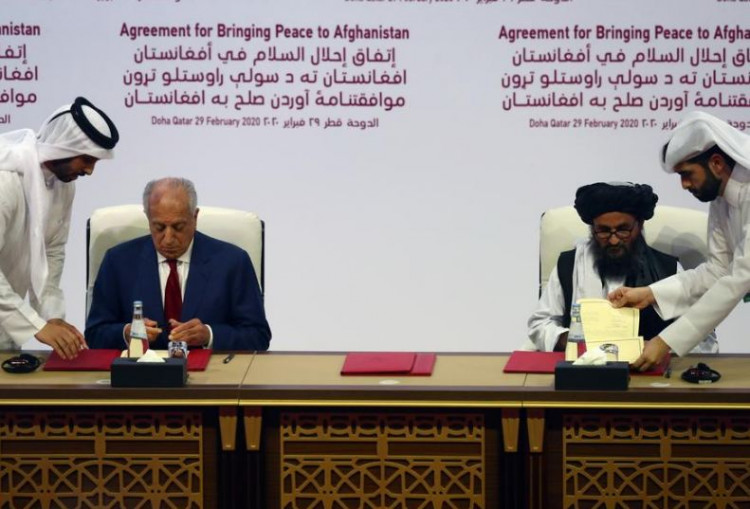The United States and the Taliban signed an accord Saturday in Doha, Qatar that might ultimately see an end to the 18 year-long U.S. war in Afghanistan. The accord, however, places too much faith on the ruthless Taliban living-up to its end of the deal.
The Taliban quickly claimed a military victory over the U.S. immediately after the accord was signed. More than 100,000 Afghans have been killed or wounded since 2009, according to the United Nations.
The agreement was signed in Doha, Qatar by Zalmay Khalilzad, president Donald Trump's Special Representative for Afghanistan Reconciliation and the chief US negotiator in the talks with the Taliban, and Mullah Abdul Ghani Baradar, the Taliban's chief negotiator.
Secretary of State Mike Pompeo witnessed the signing. Also present were leaders from Pakistan, Qatar, Turkey, India, Indonesia, Uzbekistan and Tajikistan. The signing follows a week-long "reduction in violence" requirement that saw the Taliban refrain from attacking U.S., Coalition (or NATO) and Afghan National Army (ANA) troops.
The accord sets in motion a phased and gradual withdrawal of U.S. and Coalition troops from Afghanistan. It has the potential to end the Afghan war. The U.S., however, will not automatically and immediately withdraw from Afghanistan unilaterally, said Pompeo. He clarified the U.S." will closely watch the Taliban's compliance with their commitments, and calibrate the pace of our withdrawal to their actions."
Pompeo emphasized the U.S. withdrawal will be "conditions-based. He noted the accord "sets a high bar for the things that will take place in order for America to ensure that we can accomplish both of those missions: a peace and reconciliation solution in Afghanistan and ensuring that the homeland continues to be as risk free as we can possibly make it."
Afghanistan's national security adviser Hamdullah Mohib confirmed the joint US-NATO withdrawal "is conditional on the agreement between the Taliban and the United States. If those conditions are not met, this date will also change." He did admit the government of president Ashraf Ghani is wary about the upcoming deal, which was reached without its participation.
The accord consists of four points: a timeline of 14 months for the withdrawal of all US and NATO troops from Afghanistan; a Taliban guarantee Afghanistan will not be used as a launchpad for attacks against U.S. Coalition and ANA troops; the start of intra-Afghan negotiations by March 10 and a permanent and comprehensive ceasefire. All these four prerequisites are linked to one another, and a failure to attain one jeopardizes the others.
The accord will see a reduction in U.S. troop strength to 8,600 men from the current 14,000 over the course of 135 days. Further troop withdrawals will depend on the Taliban meeting certain conditions. On the other hand, the accord provides for a complete withdrawal of U.S. and NATO troops in 14 months.
Critics of the accord claim it smacks too much of the Paris Peace Accords that directly led to North Vietnam's conquest of South Vietnam in 1975 after the U.S. withdrew its military forces from the south. Still others saw the rush by president Donald Trump to reach the agreement as being driven by his desire to score a diplomatic win to boost his chances for re-election on November 3.
Mohammed Naeem, a Taliban representative in Doha, said the accord is "a step forward." He claimed that with the deal "comes the end of war in Afghanistan," according to al Jazeera.
Pompeo called on the Taliban to honor its commitments, saying he knows there will "be a temptation to declare victory, but victory for Afghans will only be achieved when they can live in peace and prosper."
The Taliban, however, did declare victory Saturday. It again called the U.S. an "occupation" force, and blamed them for the 18 year-long war.
"The Taliban has been remarkably consistent in its public messaging, that directed towards its own members as well as externally. A 'victory' narrative is a critical part of that messaging, and is part of what binds the identity of such a large, diverse group together," said Andrew Watkins, senior analyst on Afghanistan at the International Crisis Group,
Taliban and Ghani's government are expected to meet within 10 to 15 days of Saturday's signing to begin the formal talks that might lead to the withdrawal of all foreign troops and a permanent ceasefire.
"Everyone is tired of war,'" said Mohammad Shafiq Hamdam, former deputy adviser to Ghani and senior adviser for NATO in Afghanistan. "(It) has exhausted everyone."






